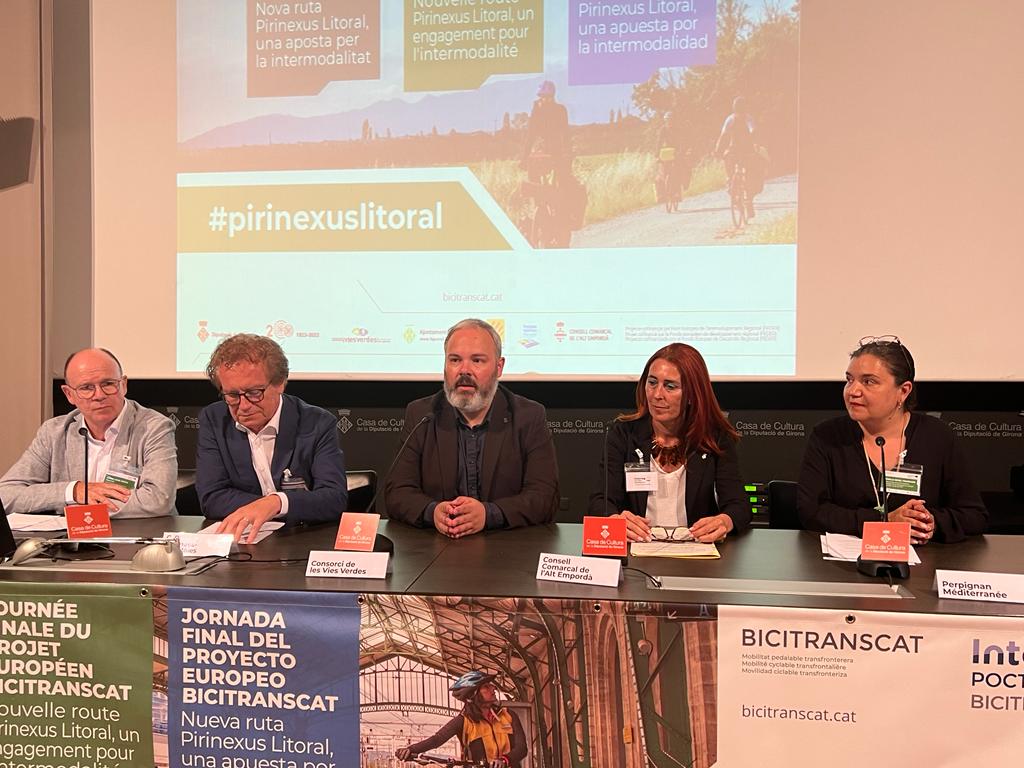News
of the routes
The most outstanding news

The European project BiciTransCat has made it possible to create new kilometres of intermodal route between Girona and France and improve services for users of the cycle routes
19/05/2022
This morning, at the Casa de Cultura in Girona, the work resulting from the European project BiciTransCat, “Development of new cycle routes and cross-border multimodal links for the promotion of sustainable mobility”, was presented. The aim of the project was to create an intermodal axis facilitating the combined use of bicycles and public transport between these two regions. This axis connects with the European cycle route EuroVelo 8, the Pirinexus route, and with French greenways. In addition, new sustainable mobility services have been incorporated, including bike parking areas and bicycle racks; bike charging points, self-repair stations and counters will also be installed, and apps have been developed to organise cross-border journeys and allow transport options to be checked.
This project has six partners: the Consorci de les Vies Verdes as leader, Consell Comarcal de l’Alt Empordà, Communauté Urbaine Perpignan Méditerranée, Ajuntament de Figueres, Conseil Départemental des Pyrénées-Orientales, and Diputació de Girona as an associated body.
The presentation was given by Eduard Llorà, Member of the Diputació de Girona and CEO of the Consorci de les Vies Verdes; Sònia Martínez, Chairman of the Consell Comarcal de l’Alt Empordà; Jean Roque, Vice-President of the Conseil Départemental des Pyrénées-Orientales; Xavier Amiel, Councillor for Urban Planning and Mobility in the Ajuntament de Figueres, and Arnelle Revel, Vice-President of the Communauté Urbaine Perpignan Méditerranée.
Among the results of the project in the section corresponding to the counties of Girona is the creation of the new Pirinexus Litoral route, 45 kilometres of new cycle path between Figueres and Vilajuïga, a generally flat track with gentle inclines that has public transport connections to the cycle paths of French Catalonia. This work connects a new sustainable mobility segment in Alt Empordà with the Pirinexus route and the European EuroVelo 8 route, and improves services for users with new bicycle parking facilities, chargers and apps that provide more information on bus and train connections.
The consortium has been involved in adapting and constructing different sections of urban cycle lanes in Figueres, Castelló d’Empúries and Roses; upgrading existing paths in Figueres and Vilajuïga; acquiring and subsequently installing panels and municipal and directional signage, as well as bicycle chargers and parking facilities.
Eduard Llorà, Member of the Diputació de Girona and Executive Chairman of the Consorci de les Vies Verdes, remarked: “This new European project has made it possible to develop a coastal alternative along the cross-border section between Figueres and Perpignan, both of which are very busy areas during the tourist season. We must continue to work on this international cooperation, which is essential.”
The vice-president of the Communauta Urbaine Perpignan Méditerranée, Arnelle Revel, stressed: “Through this project we are committed to developing the EuroVelo 8 cycling route, the Mediterranean route”, and he added: “The uniqueness of our route lies in being able to enjoy the river in an environmentally friendly setting with views of Canigó.”
Xavier Amiel, Councillor for Urban Planning and Mobility in the Ajuntament de Figueres, indicated: “We want to underline our commitment to making Figueres, a tourist destination, compatible with the ever-increasing use of bicycles.”
The Chairman of the Consell Comarcal de l’Alt Empordà, Sònia Martínez, noted that “The organisation has a work plan based on sustainability and cooperation”, and she cited the BiciTransCat project as an example of these strategies. “When institutions cooperate with one another, ambitious projects like this can be accomplished”, she added.
Finally, the Vice-President of the Conseil Départemental des Pyrénées-Orientales, Jean Roque, declared: “Today we are proud of the work we have done with our partners, as it facilitates cycling and cross-border public transport for users. These projects complement a sustainable mobility offer.” He added that, in his area, “We have expanded the digital data ecosystem related to data standardisation for the Geovelo route calculation algorithm.”
The total budget allocated for the project is around 4.5 million euros, 65% of which is co-financed by the European Regional Development Fund (ERDF) through the Interreg-POCTEFA programme, 25% by the Diputació de Girona with respect to the Catalan partners, and 10% is self-funded.
Final Meeting of the European BiciTransCat – Pirinexus Litoral Project
The presentation was part of the Final Meeting of the European BiciTransCat Project, which included a series of presentations by all the partners involved, who detailed the tasks carried out and the results obtained, as well as various presentations by guest organisations.
Program: Final Meeting of the European BiciTransCat Project | BiciTransCat






